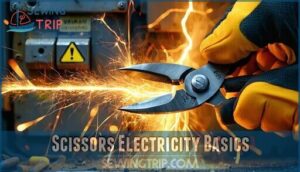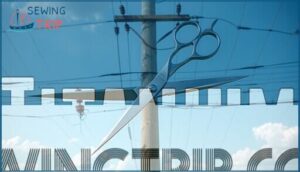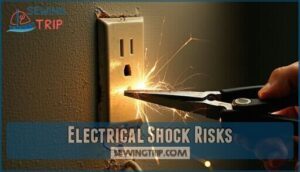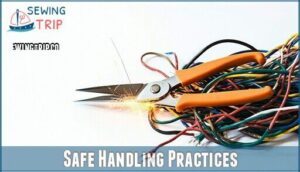This site is supported by our readers. We may earn a commission, at no cost to you, if you purchase through links.
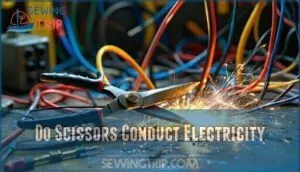
These metals allow electric currents to flow, so using scissors near live wires, outlets, or other electrical sources could give you a shocking surprise—literally.
Some scissors have plastic-coated handles, which might reduce the risk, but don’t count on them as foolproof insulators.
If you’re cutting near anything electrical, it’s safer to use non-conductive tools designed for the job.
Remember, electricity doesn’t play favorites, so avoid taking chances.
Curious about what makes different scissor materials unique? There’s more to uncover about their properties and safety.
Table Of Contents
Key Takeaways
- Scissors with metal blades, like stainless steel or aluminum, conduct electricity, so don’t use them near live wires or outlets.
- Plastic-coated handles reduce electrical shock risk but aren’t completely reliable as insulators.
- Non-conductive tools, like rubber-coated or specially insulated scissors, are safer for tasks involving electricity.
- Always prioritize safety around electrical sources; avoid testing conductivity with scissors to prevent shocks or injuries.
Scissors Electricity Basics
Scissors are typically made of metal, which makes them good conductors of electricity. Understanding how materials like metal and plastic affect conductivity helps you use scissors safely around electrical sources.
Scissors conduct electricity due to their metal blades, so stay cautious and prioritize safety around electrical sources.
Material Properties
Scissors electricity often boils down to material.
Metal conductivity depends on scissor materials like steel or aluminum, with variations due to purity effects.
Handle insulation adds safety by limiting shocks.
Material testing reveals conductivity in common metals.
Surprisingly, even stainless steel conducts electricity, though less efficiently.
- Key factors influencing conductivity:
- Steel composition
- Material purity
- Aluminum properties
- Insulation handling
- Testing methods
Conductors and Insulators
Metal conductivity allows current to flow, making scissors electricity-friendly if they’re metal.
Plastic insulation on handles reduces risks, but it doesn’t fully block electricity.
Graphite, found in pencils, conducts poorly due to its resistance. Test materials like these with circuit components to confirm their electrical conductivity.
Conductive materials carry charge, while insulation properties prevent electrical flow, ensuring safety.
Electrical Safety
Electricity doesn’t play nice with mistakes, so never ignore safety precautions.
Keep safe distances from outlets, and add outlet covers to block curious fingers.
Avoid water hazards and tangled cords near your tools, reinforcing cord safety.
Use scissors carefully—remember, they’re not insulated fully.
For cutting wires, remember that wire cutters are safer than scissors.
If electrical hazards arise, call a qualified electrician.
Tool safety isn’t optional—it’s essential for avoiding electrical shock.
Do Scissors Conduct Electricity
In the context of Scissors Conductivity, the answer lies in their Metal Composition.
Most scissors, especially those made from stainless steel, can conduct an electrical current. While the metal blades are conductive materials, the level of conductivity depends on the specific metal alloy used.
However, scissors with plastic or rubber-coated handles offer some Handle Insulation, reducing but not eliminating Electrical Hazards. While scissors might handle some tasks, it’s important to know that wire cutters are safer for electrical work.
Here’s what to keep in mind:
- Metal blades conduct electricity, posing a risk near live wires.
- Handle insulation can help, but it’s not foolproof.
- Safe alternatives, like non-conductive tools, are better for electrical tasks.
Always prioritize safety when handling scissors near electricity to avoid unexpected shocks or sparks—you really don’t want your next DIY project to include a trip to the ER!
Scissor Materials Explained
Scissors are made from various materials like stainless steel, aluminum, titanium, and carbon steel, each with unique properties affecting durability and conductivity.
Understanding these materials helps you choose the right scissors for your needs while staying safe around electricity.
Stainless Steel
When talking metal properties, stainless steel stands out for its corrosion resistance and hardness variations.
It’s often used for scissors due to its durability and resistance to wear.
While it conducts electricity, its conductivity is lower compared to other metals.
Factors like stainless steel grades and manufacturing processes influence its applications, making it a reliable choice for cutting tasks involving conductive materials, with considerations for its durability.
Aluminum
Unlike stainless steel, aluminum scissors stand out for their lightweight build and resistance to rust.
Aluminum conductivity helps these scissors slice through tough materials like carpet and vinyl with ease.
Here’s why they’re a favorite:
- Robust yet lightweight for fatigue-free handling.
- Rust-resistant aluminum properties guarantee longevity.
- Versatile aluminum alloys handle various cutting tasks seamlessly.
Aluminum scissors deliver durability and precision.
Titanium
Titanium scissors are a mix of strength and practicality.
While titanium conductivity is lower than copper, it’s better than stainless steel.
The blades’ titanium durability guarantees sharper edges, but they’re not non-conductive.
Despite titanium properties like corrosion resistance, these scissors can still conduct electricity.
Avoid using them near live wires—materials testing confirms they’re metals, not miracles!
Carbon Steel
How sturdy is carbon steel? It’s the king of cutting tools, blending hardness and durability.
However, its higher conductivity makes scissors potential electrical conductors. Rusting concerns require extra care, and sharpening frequency might be higher compared to stainless steel.
These features make carbon steel perfect for industrial applications where sharp, precise cuts matter.
- Pros: High durability, sharpness, conductivity
- Cons: Needs frequent sharpening, prone to rust
- Best Use: Industrial cutting tasks
Safety Precautions With Scissors
Always handle scissors carefully around electricity to avoid accidental shocks or short circuits. Use tools with insulated handles and keep them dry to minimize risks.
Electrical Shock Risks
Electric shocks can range from harmless tingles to serious injuries, depending on Shock Severity and the situation.
Electric shocks can cause anything from minor tingles to dangerous injuries—stay alert and always prioritize safety around electrical sources.
Metal Hazards, like scissors, increase risks near live wires. For Outlet Safety, don’t let curiosity—or scissors—explore outlets.
Use proven First Aid techniques for electric shock emergencies. In short, keep scissors out of risky zones for both workplace and home safety.
| Risk | Impact |
|---|---|
| Minor Shock | Tingling or muscle spasm |
| Severe Shock | Burns, cardiac arrest |
| Child Safety Concern | Increased vulnerability |
| Electrical Hazards | Live wires near scissors |
| Safety Tip | Avoid outlets and cut power first |
Safe Handling Practices
To guarantee safe scissor use, never handle them near electrical hazards or outlets.
Teach child safety tips, like avoiding scissors with exposed metal near wires.
Always inspect scissors for damage and use models with insulated handles when possible.
For enhanced safety, consider using non conductive options.
First aid training prepares you for emergencies, while simple safety measures can prevent accidents at home or work, promoting better electrical safety.
Non-Conductive Tools
Non-conductive tools help minimize electrical hazards and improve workplace safety.
Opt for insulated alternatives with high material resistance to reduce risks. Use non-metallic handles or coatings to improve electrical safety.
A vital addition to any kit are first aid scissors.
Follow these safe practices:
- Inspect tools regularly for damage.
- Store tools in dry environments.
- Avoid using conductors like metal near power sources.
- Keep tool maintenance up-to-date to guarantee reliability.
Emergency Response
If someone faces electrical shock hazards from metal scissors, start with a power shutoff—flip the circuit breaker immediately.
Use a non-metal, non-conductive object for safe removal of the item.
Watch for muscle spasms or unconsciousness, then perform an injury assessment.
Always seek medical attention pronto; never guess on electrocution severity.
When dealing with electrical shock, it’s crucial to act quickly and follow the right procedures to ensure safe removal and minimize harm.
Using Scissors Safely Around Electricity
When using scissors around electricity, you need to focus on preventing accidents by keeping them away from live wires and outlets.
Proper precautions, like using scissors with insulated handles, can substantially reduce the risk of shocks or short circuits, which is a key aspect of working safely with electricity.
Avoiding Electrical Outlets
Always keep scissors and other metal objects away from electrical outlets.
Even a quick slip can cause electrical shock hazards, especially with kids around.
Teach safe distances for outlet safety, and don’t forget childproofing outlets to reduce risks.
Electrical hazards can escalate quickly, so practicing shock prevention and following simple electrical safety habits is key to avoiding emergencies.
Insulating Scissor Handles
Plastic handles on scissors act as ergonomic insulators, offering grip safety and reducing electrical hazards.
Many insulated scissors use heat shrink material for better protection. If yours lack insulation, consider DIY insulation like wrapping handles with electrical tape.
For enhanced safety, consider electrical tape solutions. Insulated handle material types prevent accidents by blocking current flow through conductors like metal blades.
Prioritize electrical safety while cutting, as it is crucial to prevent accidents by using insulated handle material types and considering DIY insulation methods.
Ground Fault Circuit Interrupters
Insulating scissor handles helps, but Ground Fault Circuit Interrupters (GFCIs) add a solid layer of electrical safety.
These devices shut off power fast if a fault occurs, preventing electrical hazards. Regular GFCI testing guarantees they’re ready when needed.
GFCI installation in high-risk areas like kitchens or bathrooms is key for accident prevention. Their benefits outweigh their limitations indoors.
Scissors are also vital for emergency preparedness in first aid kits, highlighting the importance of electrical safety and accident prevention.
Regular Electrical Inspections
Regular electrical inspections can save you from accidents.
By addressing hazards early, you guarantee safety and peace of mind.
Follow these steps:
- Schedule inspections annually for preventative maintenance.
- Hire qualified electricians for code compliance checks.
- Verify safety standards using detailed reports.
- Consider consulting with a home safety expert for thorough evaluations.
- Look for hidden issues like frayed wires or sparks.
- Update outdated systems to prevent electrical accidents and ensure peace of mind.
Frequently Asked Questions (FAQs)
Do fingers conduct electricity?
Yes, fingers can conduct electricity.
Your body contains water and salts, making it a decent conductor.
That’s why touching live wires or outlets can be dangerous—electricity flows through your body to the ground.
What materials can conduct electricity?
Surprisingly, though not all shiny objects conduct electricity, metals like copper, aluminum, and steel are excellent conductors.
Even graphite, found in pencils, conducts well.
Plastics, rubber, and wood? They’re your go-to insulators—no zaps here!
What type of scissors are best for conducting electricity?
Metal scissors, especially those made of stainless or carbon steel, conduct electricity well.
If you’re testing conductivity, avoid plastic-handled versions, as they partially insulate.
All-metal scissors provide the best contact for electrical flow experiments.
Can scissors be modified to become non-conductive?
Scissors seem sturdy but carry hidden risks.
You can coat the blades with a thick non-conductive material like rubber or plastic. This keeps electricity at bay, making them safer.
Avoid cutting electrical wires altogether, though!
Are there any other materials that conduct electricity better than scissors?
Copper, aluminum, and silver are better conductors than scissors.
Copper is commonly used in wires, silver tops the conductivity chart, and aluminum offers lightweight efficiency.
Scissors, made from stainless steel, conduct well but fall behind these metals, particularly in terms of efficiency.
Are vintage scissors more conductive than modern ones?
You might think all scissors conduct electricity the same, but vintage ones, often made with purer metals, might be slightly better conductors.
Modern scissors with added alloys and coatings typically reduce conductivity for safety and durability.
Do sharper scissors pose higher electrical risks?
Sharper scissors don’t necessarily pose higher electrical risks, but their reduced surface area focuses electricity, potentially increasing heat at the point of contact.
Always avoid cutting live wires or working near electricity with metal tools.
How does blade thickness impact electrical conductivity?
Thicker blades reduce electrical conductivity slightly because there’s more material for resistance to act upon.
However, thickness plays a minor role compared to the metal type.
Stick to scissors with insulated handles for safety near electricity.
Can electromagnetic fields affect scissor conductivity?
Electromagnetic fields, like invisible wizards, don’t directly change a scissor’s conductivity.
But, strong fields could induce tiny currents in metal scissors, depending on their material.
Practically, it’s negligible—no magical shocks from your kitchen scissors, and this is due to the fact that the effects are not practical.
Conclusion
Like a key fitting into a lock, understanding whether scissors conduct electricity depends on their material.
Metals like stainless steel and aluminum conduct electricity, so handling them near live wires or outlets is risky.
Even plastic-coated handles aren’t foolproof insulators, to stay safe, use tools specifically designed for electrical tasks.
If you’re curious about scissor materials, remember their properties affect not just performance but safety too.
Always prioritize caution because electricity doesn’t forgive mistakes, and handling it requires careful consideration of the materials involved, such as stainless steel.

